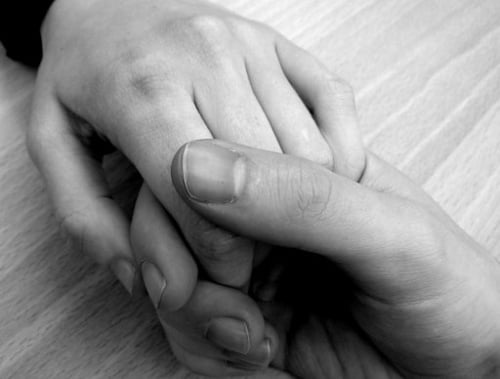This weekend, I was asked to offer a reflection and blessing at a marriage enrichment day at my parish, organized by our local Marriage Encounter.
We had very solid turnout—I’m guessing about 50 people—and the facilitators, Bob and Melinda Nobbs, did a superb job.
At the conclusion of my talk, I shared with the group what I think is a lost treasure of the pre-Vatican II marriage rite, the Exhortation Before Marriage. This was customarily read by the priest in place of a homily (and some priests, I’m told, still use it). At a time when marriage and weddings have been commercialized, sentimentalized, and trivialized, this potent address serves to remind all involved—including the guests—what is really at stake. Marriage is something serious, to be entered into soberly, carefully, prayerfully.
The couples at the marriage enrichment day had never heard of this exhortation and after I read it, the response was nearly unanimous: “Where can I get a copy of that?” Here it is. I think every couple preparing for marriage should read it, pray it, reflect on it, discuss it as part of their pre-Cana. Every couple who is married should be introduced to it, as well.
This is what it is all about.
+
My dear friends: You are about to enter upon a union which is most sacred and most serious. It is most sacred, because established by God himself. By it, he gave to man a share in the greatest work of creation, the work of the continuation of the human race. And in this way he sanctified human love and enabled man and woman to help each other live as children of God, by sharing a common life under his fatherly care. Because God himself is thus its author, marriage is of its very nature a holy institution, requiring of those who enter into it a complete and unreserved giving of self. [But Christ our Lord added to the holiness of marriage an even deeper meaning and a higher beauty. He referred to the love of marriage to describe his own love for his Church, that is, for the people of God whom he redeemed by his own blood. And so he gave to Christians a new vision of what married life ought to be, a life of self- sacrificing love like his own. It is for this reason that his apostle, St. Paul, clearly states that marriage is now and for all time to be considered a great mystery, intimately bound up with the supernatural union of Christ and the Church, which union is also to be its pattern.]
This union, then, is most serious, because it will bind you together for life in a relationship so close and so intimate, that it will profoundly influence your whole future, That future, with its hopes and disappointments, its successes and its failures, its pleasures and its pains, its joys and its sorrows, is hidden from your eyes. You know that these elements are mingled in every life, and are to be expected in your own. And so not knowing what is before you, you take each other for better or for worse, for richer or for poorer, in sickness and in health, until death.
Truly, then, these words are most serious. It is a beautiful tribute to your undoubted faith in each other, that recognizing their full import, you are, nevertheless, so willing and ready to pronounce them. And because these words involve such solemn obligations, it is most fitting that you rest the security of your wedded life upon the great principle of self-sacrifice. And so you begin your married life by the voluntary and complete surrender of your individual lives in the interest of that deeper and wider life which you are to have in common. Henceforth you will belong entirely to each other; you will be one in mind, one in heart, and one in affections. And whatever sacrifices you may hereafter be required to make to preserve this mutual life, always make them generously. Sacrifice is usually difficult and irksome. Only love can make it easy, and perfect love can make it a joy. We are willing to give in proportion as we love. And when love is perfect, the sacrifice is complete. God so loved the world that he gave his only-begotten Son, and the Son so loved us that he gave himself for our salvation. ” Greater love than this no man hath, that a man lay down his life for his friends.”
No greater blessing can come to your married life than pure conjugal love, loyal and true to the end. May, then, this love with which you join your hands and hearts today never fail, but grow deeper and stronger as the years go on. And if true love and the unselfish spirit of perfect sacrifice guide your every action, you can expect the greatest measure of earthly happiness that may be allotted to man in this vale of tears.
The rest is in the hands of God. Nor will God be wanting to your needs, he will pledge you the life-long support of his graces [in the Holy Sacrament which you are now going to receive].













